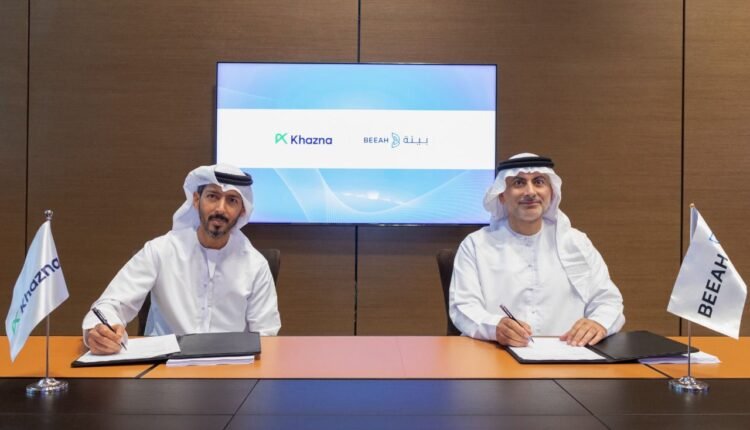Khazna Data Centers, wholesale data centre providers in the Middle East and North Africa, and BEEAH Digital, BEEAH Group’s digital transformation and future technology business, have formed a joint venture that will bring to Sharjah its first Tier 3 data centre. Data centres are fast becoming the foundation blocks of smart cities that safeguard business continuity, key operations and data sovereignty. In response, the joint venture between BEEAH Digital and Khazna Data Centers is advancing the digital infrastructure in Sharjah, starting with an industry-standard Tier 3 data centre. The data centre will be equipped with high-tech security, fire and environmental control systems, and full redundancy grade power. The newly established joint venture will be called One Data Center SPV Limited and will operate under the name of Khazna Data Centers.
In a signing ceremony recently held at the BEEAH Group Headquarters, Hassan Alnaqbi, CEO of Khazna Data Centers, and Khaled Al Huraimel, Vice Chairman and Group CEO of BEEAH Group, officially formed the joint venture. As the venture’s inaugural project, the Tier 3 data centre in Sharjah will support the Sharjah Government’s ambitious digital transformation efforts. It will also enable organisations across the UAE to pursue digitally led operations that deliver high-performance services that are scalable, create new jobs and commercial opportunities, as well as foster customer satisfaction.
Once operational, the data centre will have a capacity of 9 MW. It will have multiple power and cooling pathways, maximising uptime while minimising the cost of maintenance and power. Technologies to reduce cooling requirements will be integrated into the data centre. With solar power, the project will minimise emissions relating to power consumption. Inside, smart LED lighting with motion sensors will also help conserve energy. With a Power Usage Efficiency of 1.5 and below, the data centre will be more energy-efficient compared to the industry average. The data centre will also be designed to reduce water consumption with systems to reuse and recycle wastewater. It is aligned with Khazna’s ‘Future First Strategy’, which aims to achieve carbon-neutrality operations across all its sites by 2050. The data centre is also aligned with the purpose of BEEAH Digital, which works to accelerate sustainable impact for societies using robust digital solutions. Ultimately, the data centre will adopt net-zero waste standards and certifications, benchmarked against the UAE’s sustainability agenda and the United Nations Sustainable Development Goals. Khazna and BEEAH Digital are committed to exploring renewable energy sources to meet the data centre’s power requirements. The facility will also be constructed to achieve green building certifications from Estidama and LEED. Earlier this year, BEEAH Group launched the region’s first commercial-scale, waste-to-energy plant in Sharjah with a 30 MW output. A portion of the output from this waste-to-energy plant is being explored as a potential energy source.
Hassan Alnaqbi, CEO of Khazna Data Centers stated: “Data centres are cornerstones in enabling innovation and driving growth for businesses across a variety of sectors. They are also creating digital opportunities and seamless connections as businesses continue to develop and scale their operations. At Khazna Data Centers, we are focused on further investments in building the infrastructure in UAE to enable our existing and new customers in Sharjah, specifically to launch their services closer to their consumers. The data centre will be well-positioned to support businesses in enhancing the experiences of their customers, unlocking the value of technologies, and making headway on their carbon footprint reduction goals by meeting their environmental and sustainability needs.”
Khaled Al Huraimel, Vice Chairman and Group CEO, BEEAH Group, said: “Keeping communities connected and providing ready access to digital services is essential for a good quality of life. With a Tier 3 data centre, we can enhance the available infrastructure to government entities as well as private companies. The advanced IT infrastructure will help boost investments, attract business and bring world-class services and data sovereignty for the wider public.”












